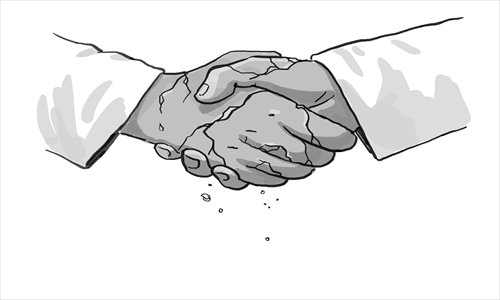Breaking shackles of past harm vital for lasting peace

To fully understand China's attitude toward Japan today, we have to be aware of the country's modern history.
Memories of the "century of humiliation" still determine much of China's attitude in international affairs, whether it be toward Japan, the US, Russia, or Europe. And contrary to some Western commentators' perceptions that the Chinese government's attitude does not have popular support, most of the public back the hawkish stance.
For that same reason, China voted against military intervention in Syria. In the Chinese mind, any country that ever sent soldiers to China when China was weak both economically and militarily does not have the right to tell China what to do today, because China never sent a soldier to any of these countries.
This is the simple but fundamental psychological source of China's non-interference foreign policy.
For Zionist Israelis, the years of Jewish exile and anti-Semitism culminating in the Holocaust are the fundamental element of their national consciousness. This is comparable to the Chinese fixation with national humiliation, embodied in our string of losses to the imperial powers, culminating with the Japanese invasion in 1937.
That the two ancient nations share mutual sympathy based on their recent history of suffering is far more powerful than their more commonly quoted long history of civilizations and cultural values.
For both Israel and China, having a delineated territory and the power to protect their people is the only way to ensure these tragedies never happen again.
Sun Yat-sen, the founding father of the Kuomintang Party, sympathized with the Zionist movement because of this exact shared mentality between these two peoples.
But as with the Holocaust to the Jews and the Opium Wars to the Chinese, the Nakba, the expulsion of the Palestinians, remains a shared national tragedy and humiliation both for the victims and their families and the wider Arab world.
Right now the deadlock in the quest for permanent peace between the Israelis and Palestinians stems from the stubbornness of both nations and their refusal to change narratives based on victim mentality.
Without a mutual understanding that both nations need to put up their tragic memories on hold for the sake of peace, and change their national narratives to reflect this desire, psychological hurdles will always be the biggest enemy for a genuine two state solution.
No border will be safe for the always insecure Israelis, and no land swap will satisfy the revengeful desire of the Palestinians to reclaim all their homeland back, until both sides sincerely admit coexistence is the only future and that their historical wounds need to take a backseat.
This is always easier said than done. Trying to persuade the Chinese to forgive the Japanese for their 1895 land grab or the invasion and atrocities committed in China is next to impossible.
Nevertheless, this is probably the most important psychological stumbling block to overcome if the Chinese are to accept any international solution in the island dispute between the two countries.
For the Japanese, admitting that returning the islands will not automatically lead to Chinese claims on other Japanese territories is something similarly hard to swallow. But this might be the only right course to take for each nation.
Perhaps the Chinese, the Japanese, the Palestinians and the Jews need to learn from the postwar European countries, especially France, Germany, and Poland, who managed to overcome their hatreds to each other and rewrote their national narratives, so that the ensuing almost 70 years of peace has been a role model and a source of hope for the world.
The author is director of the Institute for Hebrew and Jewish Studies at Peking University, editor-in-chief of the California-based Journal of Sino-Western Communications, and director of the Center for Middle Eastern Studies at Shanghai Jiaotong University. opinion@globaltimes.com.cn
Counterpoint: Silence may be better than anger in East Asian discourse